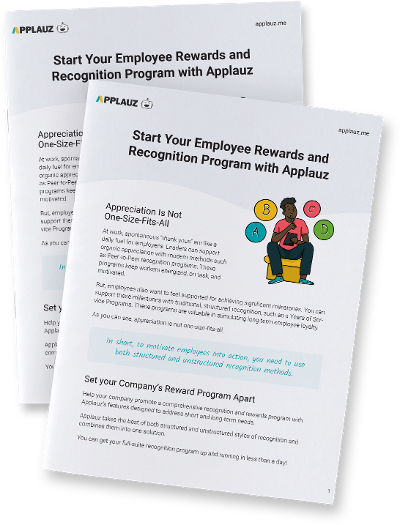Question for all managers out there: Do you think you're doing a good job of recognizing your employees?
One particular survey showed over half of managers (51%) thought quite highly of themselves when asked the same question. Meaning — they believed they were doing a good job of recognizing employees.
But, when surveying employees, the same survey found that only 17% of employees felt their manager did a good job recognizing them.
These findings suggest your employees might not feel as appreciated as you think!
So, as a manager or supervisor what can you do?
It's simple, work on giving more meaningful and powerful employee recognition.
Employee recognition should be about quality over quantity. In other words, focus on saying the right things.
First, let's explore the typical reasons why a manager's recognition might fall short.

Do you struggle giving employee recognition?
Sharpen your recognition-giving skills in less than 20-minutes. Discover proven best practices for providing recognition with our Recognition Training for Managers.
Explore the training
 When Recognition from Managers Lacks Impact
When Recognition from Managers Lacks Impact
Dr. Paul White, psychologist and author of The Vibrant Workplace (2017) and 5 Languages of Appreciation at Work (2012), explains some key insights as to why appreciation sometimes lacks emotional impact.
- You're not speaking the employee's appreciation language.
- You're focusing too much on praising performance and productivity.
- You're giving halfhearted recognition just to "go through the motions."
Let's explore each issue in greater detail.
Speaking the employee's appreciation language
Speaking an employee's appreciation language means you're communicating appreciation in a way that resonates with the employee.
You might unintentionally be giving recognition in a way that doesn't resonate with some employees.
For example:
- You only give employees recognition through public shouts outs during team meetings.
- You only give recognition privately during one-on-ones.
- You offer recognition through actions (and not words), for example, by organizing a social event for your team.
None of these ideas are inherently bad. However, these recognition methods might not speak to all the employees on your team.
If you want to offer employees impactful recognition, be sure you understand how employees prefer to be appreciated.
For instance, imagine you are only praising employees publicly. This public recognition might feel great for some employees. In contrast, others may feel shy or embarrassed. Being aware of these personal differences is essential!
How can you make sure you're speaking an employee's appreciation language? It's simple. Just talk with your team members directly. If your team is larger, consider sending out a quick poll or Google form to collect this information.
Focusing praise on the employee's productivity
Praising output is very common thing managers do. It sounds like this:
- "Great job on meeting our sales objectives for the quarter!"
- "Amazing job on the sales presentation.
- "Thank you for your speed on this report."

The idea is not to stop praising output altogether. But instead, finding the right balance.
This means adding a few words that draw attention to why this employee is unique and what they did differently. In short — be very specific and personal.
Because here's the reality: most people can complete a task. People want to be recognized for more than ticking something off a to-do list.
Bottom line: Employees want to feel seen and valued for more than what they produce. So, focus words of appreciation on details that demonstrate that you truly see an employee for their unique abilities, personality, and talent.
Giving recognition to go through the motions
For many managers who already have their plates full, recognition has become a standard management practice.
In other words, managers may feel obliged to offer recognition as part of their duties. As a result, they may give lacklustre praise to simply "go through the motions."
The problem: When employees receive halfhearted praise, words of recognition risk feeling shallow, and at worse, completely insincere.
The solution is simple: Only give recognition when it's true. In other words, praise employees when you feel they truly deserve it. It doesn't matter if that's only once a month or even less.
When managers give sincere, genuine praise, it's more beneficial than shallow and empty praise. In other words, don't give recognition just to say you did it to your manager or director. Remember, recognition should be about quality, not quantity.
In short, managers should be aware of the importance of expressing appreciation, but most importantly, and of doing it mindfully and sincerely.
In the next section, we'll outline our framework for giving powerful recognition. You can be sure that your precise words of appreciation will have a real impact on employee sentiment.
 How to Give Powerful Verbal or Written Recognition to Employees
How to Give Powerful Verbal or Written Recognition to Employees
The one word you should remember here is personalization.
Why is personalizing so important? People want to feel special; they want to hear about what makes them stand out.
Now, let's look at the difference between these two recognition messages, so you can see how even a few extra words make a world of difference.
consider this section the best practices for writing strong employee appreciation messages.
Example 1: "I'd like to thank Cindy for giving me her input on the Gizmo Presentation. She took the time to help our team, even though she is busy, and I appreciate it!
Example 2: "I want to thank Cindy for offering her input on the Gizmo Presentation. She has an incredible eye for detail I've always admired. And she always gives us creative suggestions I'm confident our prospects will appreciate. We were in need of an extra pair of eyes, and she was there without hesitation when we asked her."
Which message would you like to receive from a coworker? I imagine most people would choose the second message!
Of course, a simple "thank you" or "great job" is always appreciated.
But impactful appreciation should be more precise and tailored to the person receiving it.
When offering employee recognition remember to always include — PEP
At Applauz, we've come up with a simple framework (and acronym — PEP) to help anyone learn how to express genuine and impactful appreciation.
By applying this acronym, you can provide meaningful words of recognition every time!
- Personal:
- This means recognition should include words that highlight someone's unique character, personality, or skills.
- It also can mean recognizing the qualities you admire about them.
- Appreciate someone for their unique talent and effort.
- In the example above, we see that Cindy's coworker highlights her creativity.
- Earned:
- Recognition should be based on merit.
- Avoid giving recognition just to go through the motions.
- Give recognition when an employee shows discretionary effort. I.e. goes the extra mile.
- In the example above, Cindy went above and beyond to offer her input. In this case, Cindy's efforts warrant detailed recognition.
- Process:
- Ask yourself what this person did differently in the process.
- What was their unique contribution? What knowledge or skill did they apply?
- Recognize the employee’s unique perspective or point of view.
- In the example above, Cindy used her strong eye for detail to help her coworkers deliver a great sales presentation.

Start Your Employee Rewards & Recognition Program with Applauz
Final Thoughts
The importance of employee recognition is undeniable. So if you want to give impactful verbal or written recognition to employees, make sure to keep these simple best practices in mind.
If your team participates in a Peer-to-Peer recognition program, remember to share these tips with your employees. They should be offering recognition to their peers as well!
- Understand how your employees prefer to receive praise: Acknowledge whether your employees prefer public or private feedback, for example. Or if they prefer tangible items or social events as a reward.
- Focus on praising the employee's unique qualities, not only their performance: A recognition message should be personalized and highlight what you admire about them. Or point out their character and skills.
- Only give recognition if it's true: Don't give halfhearted recognition to "go through the motions." Offer sincere and detailed recognition when employees truly deserve it.
About the author
 Michelle Cadieux
Michelle Cadieux
Michelle is a content writer for Applauz. She holds a Bachelor's degree in Psychology from Concordia University, and she has been writing about work and employee happiness for over five years.


